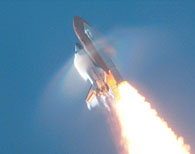Atlantis blasts off on mission to international space station
After two frustrating weeks of delays, space shuttle Atlantis and its six astronauts blasted off Saturday on a mission to resume construction of the international space station for the first time since the Columbia disaster 3 1/2 years ago.

The shuttle rose from its seaside launch pad through a partly cloudy sky at 11:15 a.m. (1515 GMT).
"It was worth the wait and we're ready to get to work," said Atlantis commander Brent Jett.
Jett and his team have trained for longer than any crew in the past, and the extra time will probably be an advantage. They face one of the most challenging construction tasks in space history.
As the shuttle streaked into space, more than 100 cameras zoomed in for any signs of foam breaking off its external fuel tank, the problem that doomed Columbia.
A chunk of the hard foam appeared to hit the shuttle's belly, but "it didn't look like there was any damage," Mission Control told the Atlantis crew. The noticeable foam loss came more than four minutes into the launch, when it poses less of a damage threat, said LeRoy Cain, chairman of the mission management team.
Launch director Mike Leinbach called the liftoff "really, really clean," and NASA Administrator Michael Griffin described it as "majestic."
"Not everything in the count leading up to this day was easy," Griffin said. "We had to dodge tropical storms, lightning strikes and things like that."
There was a slight problem when a freon coolant system did not work properly during ascent, but NASA did not view it as a major concern. The fuel cells that forced launch delays earlier in the week were working as expected, NASA spokesman Kyle Herring said.
"Great work!" astronaut Jeff Williams said minutes after the launch from the space station 220 miles (350 kilometers) above Earth, reports AP.
Atlantis carried one of the heaviest payloads ever launched into space a 17 1/2 ton truss section that will be added to the half-built space station. It includes two solar arrays that will produce electricity for the orbiting outpost. Atlantis' weight was so much that it only had a crew of six, instead of the usual seven astronauts.
The astronauts will make three spacewalks during the 11-day flight to install the $372 million (Ђ292.61 million) addition.
Subscribe to Pravda.Ru Telegram channel, Facebook, RSS!


